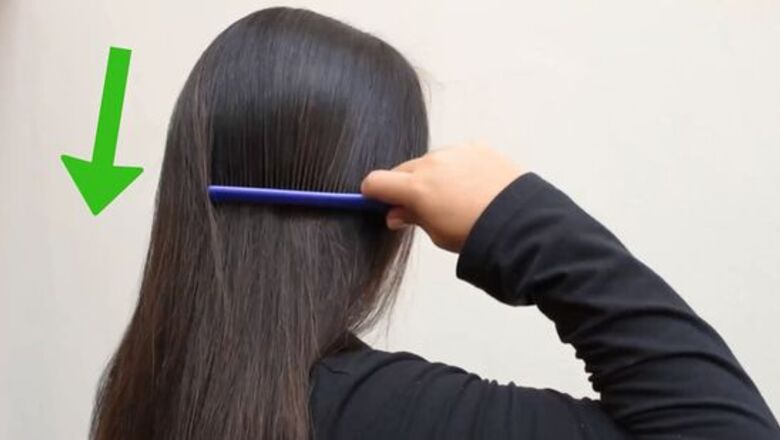
views
- Separate your hair into three even sections using your fingers or a comb.
- Hold the right section in your right hand and the left section in your left hand. Leave the middle section to hang loose in the center.
- Grab the right section and pull it over the middle section. The right and middle sections will now have switched places.
- Repeat this with the left and middle strands, grabbing the left side and crossing it over the middle. Repeat this until you reach the end of your hair.
3-Strand Braid
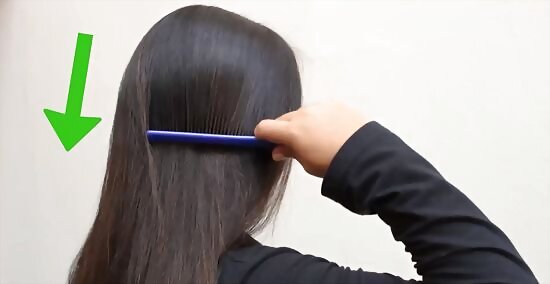
Detangle your hair using a brush or wide-toothed comb. Braiding goes a lot faster with hair that’s kept knot-free. Keep brushing your hair out until your comb or brush pulls easily through without getting snagged on any tangles and knots. If you're working with thick or layered hair, use a bit of water or leave-in conditioner to dampen the hair first. This will make it easier to handle. Braiding your hair when it’s damp will give it a very smooth, tight appearance. Meanwhile, braids done on dry hair will have a bit more of a messy look. If braiding your hair dry, do it a few days after washing so that it’s not so slippery. Slightly oily hair will hold a braid better than freshly washed hair, and you'll have fewer flyaways.
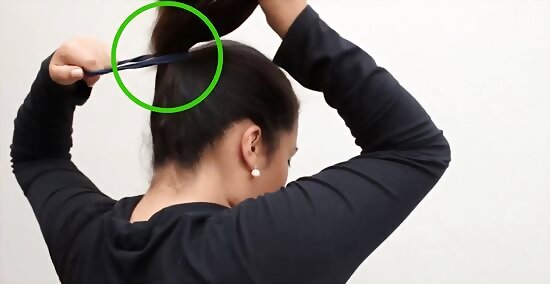
Tie your hair into a ponytail to make a secure base. If you tie your hair into a ponytail or half ponytail with a hair tie, your braid will be easier to handle and come out neater. Once you’ve gotten the hang of braiding starting with a ponytail, move on to braiding loose hair at the nape of your neck.
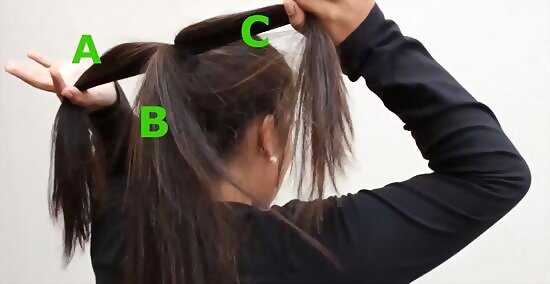
Divide the hair into three even sections. These will be the three strands of your braid. Separate your hair into three sections using either your fingers or a comb, and make them as even as possible. Grab the right section with your right hand and the left section with your left hand, letting the middle section hang free. Hold the strands so that you're grasping them against your palm with your middle, ring and little fingers, keeping your index fingers and thumbs free.
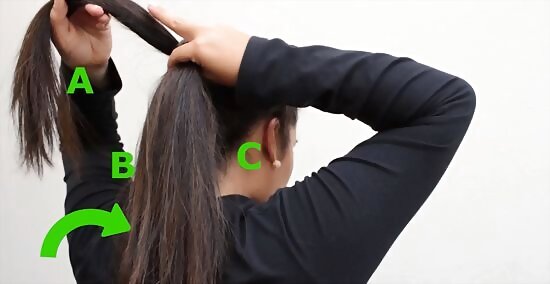
Cross the left section over the middle section. With the index finger and thumb of your left hand, grab the section of hair that’s in the middle. Using the index finger and thumb of your right hand, grab the left section of hair that's grasped against your left palm. The section that was originally on the left is now the middle section. If your strands started out as A B C, they should now be ordered as B A C.
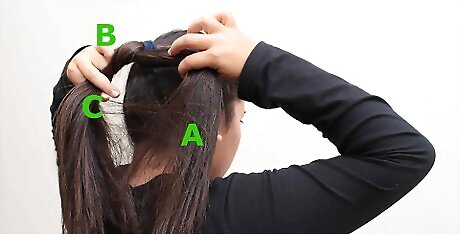
Cross the right section over the middle section. In your left hand, shift the strand that's between your index finger and thumb so that your other fingers are holding it securely against your palm. Use your left index finger and thumb to grab the section of hair that's being held against your right palm (but not the one being held by the thumb and index finger). The original right-hand section is now the middle section. Your strands that were ordered B A C will become B C A.
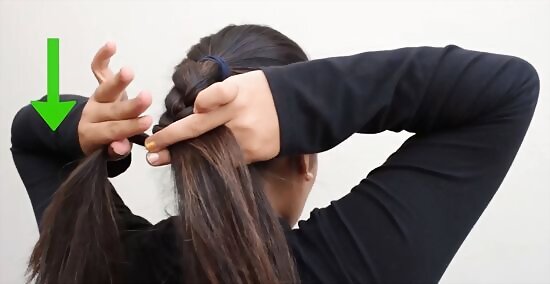
Continue layering the left and right sections over the middle strand. Keep using the free index finger and thumb of one hand to grab the section of hair held against the palm of the other hand. Repeat until you run out of space to braid, leaving about 1–3 inches (2.5–7.6 cm) of unbraided hair at the end. Tighten the braid as you go and keep the tension even for all 3 sections by gently pulling down on the braid as you weave. Any time a strand changes hands, tug gently on the hair so that the braid gets tightened.
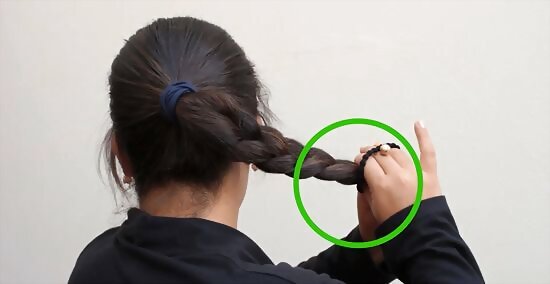
Secure the braid using a hair tie. You might have to wrap it around the hair several times to make it tight enough. Avoid using rubber bands, as these can damage the hair and be difficult to remove at the end of the day. Use a ponytail holder that’s the same color as your hair or translucent so that it blends in with your braid. This makes your braid look more natural.
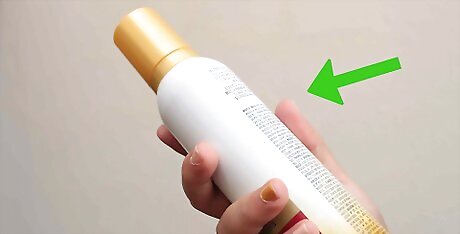
Set the braid using hairspray. Applying hairspray or spray gel is great for preventing flyaways that can spring up as the day goes on. Hold your hairspray about 12 inches (30 cm) away from your head and lightly mist the entire length of your braid. If you decide to use hairspray, apply it before adding any other hair accessories, like headbands or clips. Use a shine serum along your braid to give it some extra glow. Rub a bit of serum between your hands and then run them along the length of the braid. Use a nourishing oil to protect your braids at night.
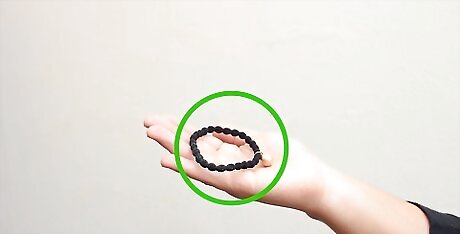
Add some fun accessories to make your braid stand out. Use some colorful ribbon to make a bow at the end of your braid for extra flair. Stick on a cute hair pin or brooch near the base of your braid, or use them to hold back your bangs.
Play with traditional braids to create other styles. Traditional braids are easy to incorporate into other styles. Braid a tiny accent braid that hangs loose, or pin your accent braid across your head to create a headband. You can also dress up a ponytail by braiding it into a traditional braid. Experiment with braiding all of your hair or just small sections until you find some styles you like.
French Braid
Comb out any knots. French braiding can be particularly tricky if your hair is tangled, so take a few minutes to remove knots with a brush or wide-toothed comb. Work in small sections and start at the bottom and work your way up. If you detangle your hair starting at your scalp, your hair will be more likely to break when you come across a tangle.
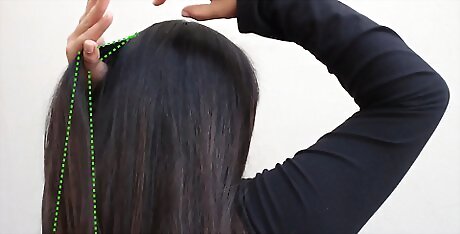
Create your starter section by grabbing the hair closest to your forehead and temples. For a traditional French braid, grab a small section of hair next to your left temple, in the center of your scalp close to your forehead, and next to your right temple. You don't have to start a French braid at the top of your head. This is the easiest starting point for beginners, but a French braid can technically be started from any point on your head. Just make sure you're including the hair above your ears in your starter section if you decide to braid moving downwards. You can create multiple French braids on your hair using several parts. If you have short hair, it may be easier to make two medium braids rather than one large one.
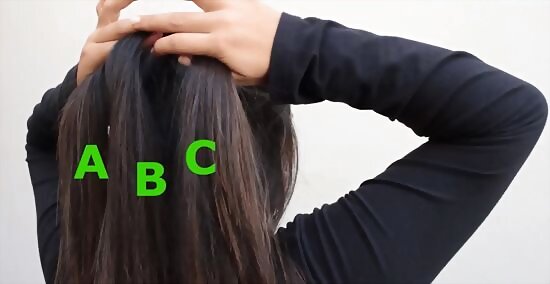
Separate your starter section into three equal sections. These three strands will make up the beginning of the braid. Divide your hair using your fingers or a comb, and make them as even as possible. Make sure the strands start from the same row of hair. For example, divide your sections so that they all start at the very edge of your scalp. Keeping the three strands close together will make starting the braid easier as well.
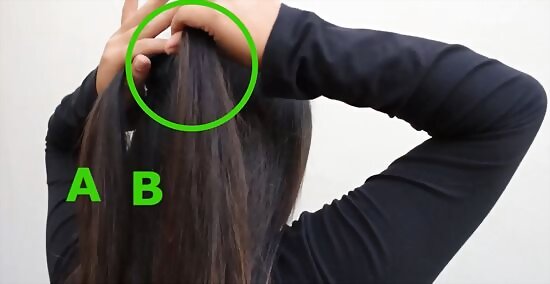
Hold the left strand in your left hand and the middle and right strands in your right hand. Grasping the strands correctly will help you braid neatly and quickly. Though you might find another way that's more comfortable for you, here's a basic beginning grip: Grasp the left strand in your left hand. Grasp the center strand between the thumb and index finger of your right hand. Grasp the right strand between your right palm and the remaining three fingers of your right hand.
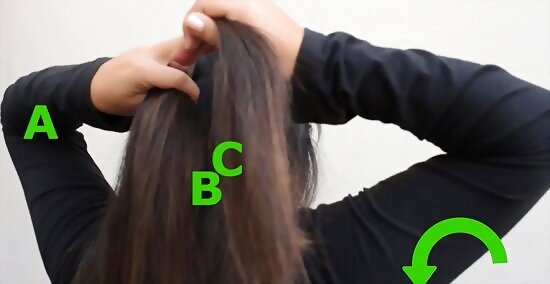
Cross the right strand over the center strand. With the last three fingers of your left hand, grip the left strand between your fingers and your palm. With your left thumb and index finger, reach over the center strand and grab the right strand to pull it over the middle strand. While doing this, maintain your hold on the center strand with your right index finger and thumb. You should now have two strands in your left hand and one in your right hand, and the right strand should now be in the center.
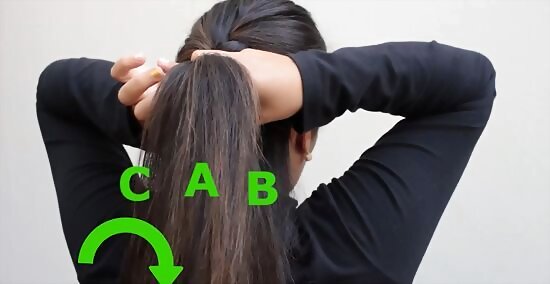
Move the left strand to the center. With the last three fingers of your right hand, grip the right strand between your fingers and your palm. This will free up your right thumb and index finger to reach over the center strand and grab the left strand. Bring the left strand over the center strand so that they switch positions. You should now have two strands in your right hand and one in your left hand.
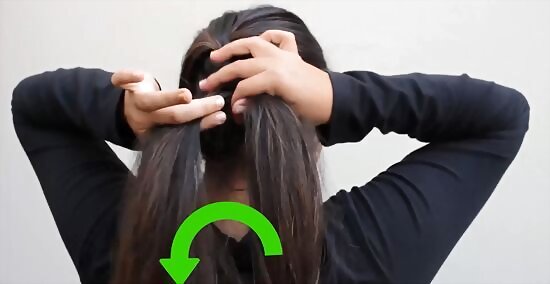
Add hair to the right strand. Let go of the center strand and allow it to hang between the left and right strands. Grip the left strand between the last three fingers of your left hand and your left palm and grab the right strand with your left thumb and index finger. Using your free right hand, pull up a small section of unbraided hair from the right side of your head. Grab this new section with your left thumb and index finger to add it to the right strand of the braid. Grab the center strand with your right hand and move it to the right, making it your new right strand. The section you added hair to, between your left thumb and index finger, is the new center strand. Up until now, you've done a regular braid. Adding in unbraided hair is where the "French" part of the process comes in.
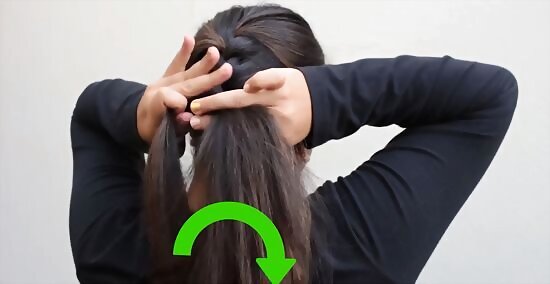
Add hair to the left strand. Let go of the center strand again and grip the right strand between the last three fingers of your right hand and your right palm. Then, grab the left strand with your right thumb and index finger. Using your left hand, pull up a small section of unbraided hair from the left side of your head. Grab the new section with your right thumb and index finger to add it to the left section of the braid. Pick up the center strand with your left hand and cross it under the left strand. The section you added hair to, between your right thumb and index finger, is the new center strand. For an even braid, grab the same amount of hair on each side when you’re adding hair to the braid.
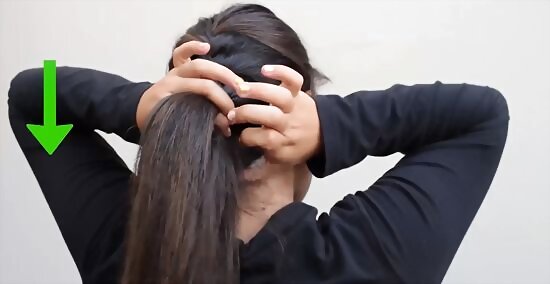
Continue braiding in this pattern. Keep adding hair to the right and left strands as you work your way down. You’ll eventually run out of new hair to add to the braid when you reach the nape of your neck. To keep the braid looking as neat as possible, create parallel lines on each side of your head using a comb or your fingers as you gather sections of hair. This helps keep your sections about the same size as you finish your braid.
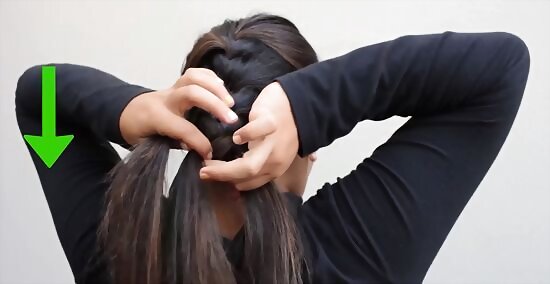
Finish by tying the rest of your hair up in a basic braid. Once you’ve run out of new hair to add, continue doing a regular 3-strand braid until you reach near the bottom of your hair.
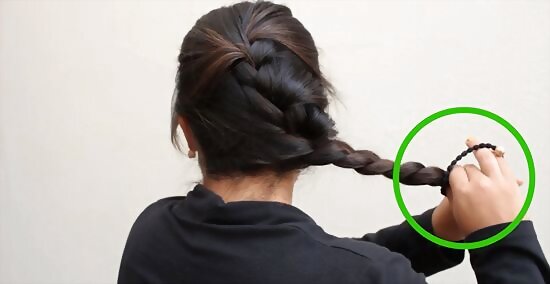
Secure the braid using a hair tie. Use a hair tie the same color as your hair or one that’s clear so that it blends in. Avoid rubber bands, which can damage your hair and be difficult to remove.
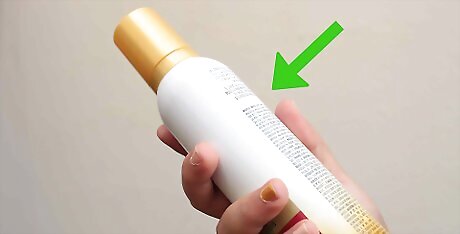
Set the braid with hairspray. Hairspray or spray gel will keep your French braid looking neat and clean throughout the day. Hold the product about 12 inches (30 cm) away from your hair, then lightly spritz the length of your braid. If you're going to add other accessories to your hair, hairspray it first. This will prevent flaky residue from getting on your barrettes or ribbons. Applying shine serum along your braid will help keep your hair looking smooth and soft.
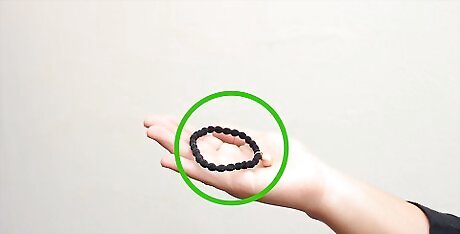
Add accessories to embellish your braid. Tie on a length of colorful ribbon at the end of your braid, or secure some cute clips and barrettes here and there for decoration.
Fishtail Braid
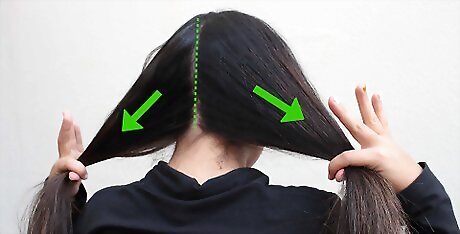
Separate your hair into two even sections. A fishtail braid looks like it's made of several small strands, but surprisingly there are only two primary sections. Split your hair into two even sections, holding the right section in your right hand and the left section in your left hand. For a neat braid, use a fine-toothed comb to make a straight part down the middle of your head, from your forehead to your nape. For a more tousled, Katniss Everdeen-inspired look, just part your hair with your hands and separate it into two sections that are mostly even. Fishtailing can be done with either damp or dry hair.
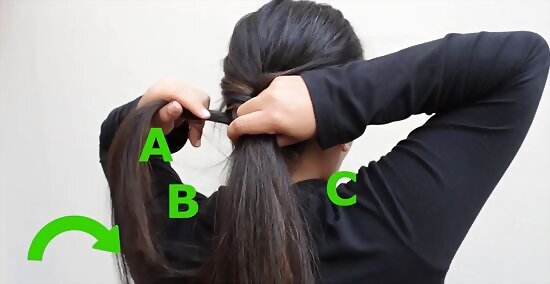
Pull a small strand of hair from the left section into the right section. Keep holding the right section of hair in your right hand and drop the left section so it hangs loose. Using your left hand, pull up a small strand of hair from the side of the left section of hair that's closest to your ear. Grab this small strand with your right index finger and thumb and incorporate it into the right section of the braid.
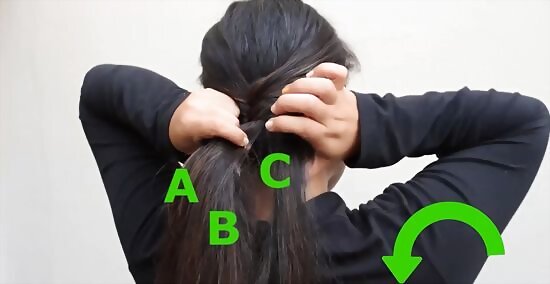
Pull a small strand of hair from the right section into the left section. Pick up the left section with your left hand and drop the right section so it hangs loose. Using your right hand, pull up a small strand of hair close to your right ear. Grab this small strand of hair with your left index finger and thumb and bring it over the right section and into the left. Finally, pick up the right section again in your right hand. For a more intricate-looking braid, pull up smaller strands of hair. For a quicker braid, grab larger sections.
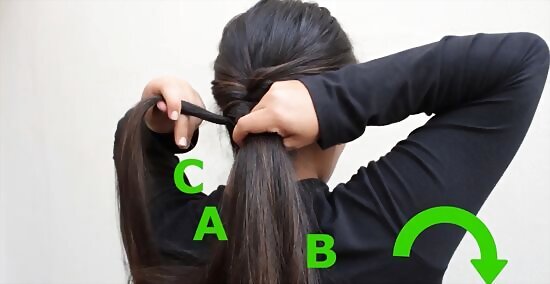
Repeat this pattern until you run out of hair. Keep alternating sides and adding strands until you reach the end of your hair. Keep the small strands that you pull into the main sections as evenly sized as possible to achieve a clean-looking braid.
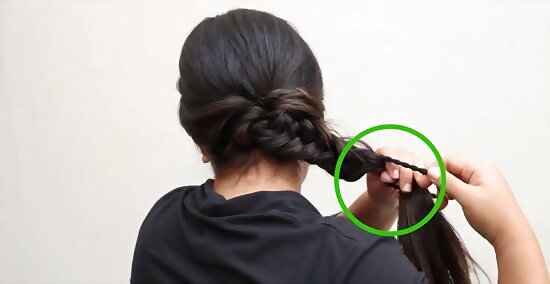
Secure your fishtail braid with a hair tie at the very end. Loop the hair tie around your hair a couple of times until it’s tight. Avoid using a rubberband, as this can get caught in your hair and can be a bit more painful to remove later.
5-Strand Braid
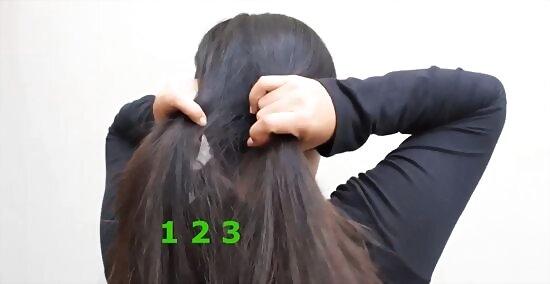
Separate your hair into five equal sections. A 5-strand braid looks more intricate and elegant than a standard 3-strand braid. Start by dividing your hair into five separate strands using either your fingers or a comb. Make the sections as even as possible. Pull your hair into a ponytail first to create a stable base for braiding. This is a good technique to use if you’re trying out this braid for the first time. It's easiest to braid a 5-strand braid when your hair is wet or greasy from going a few days without being washed. This makes your hair less slippery and prevents fly-aways from getting tangled up in other strands.
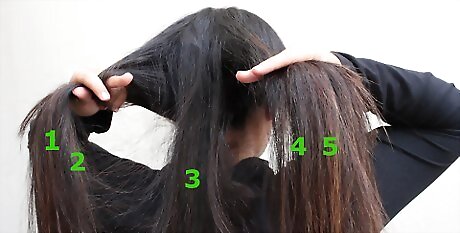
Hold the two left strands in your left hand and the two right strands in your right hand. Leave the center strand to hang loose down the middle. Numbering the strands can help you keep them straight. They should look like 1 2 3 4 5.
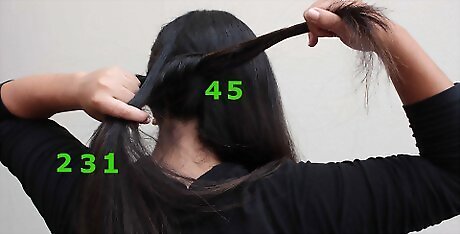
Move the leftmost strand to the center. Hold the hair in your right hand using your middle, ring, and pinky fingers and use your right index finger and thumb to grab strand 1. Then, move strand 1 over under 2 and over strand 3 so that it's now in the center. Grab strand 3 in your left hand and let strand 1 now hang loose in the middle. You should now have 2 3 1 4 5.
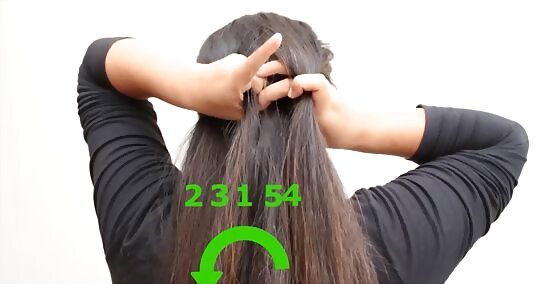
Weave the rightmost strand (strand 5) to the center. Hold strands 2 and 3 in your left hand using your middle, ring, and pinky fingers. Then, use your left index finger and thumb to grab strand 5 and move under strand 4 and over strand 1. Grab strand 1 in your right hand, and let strand 5 hang loose in the center. You should now have 2 3 5 1 4.
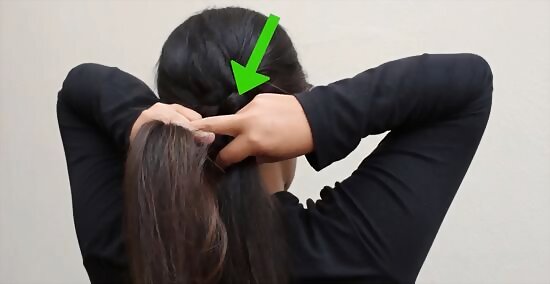
Continue weaving your hair until you reach the end. Continue this process of weaving the outer strands to the center until you reach the end of your hair.
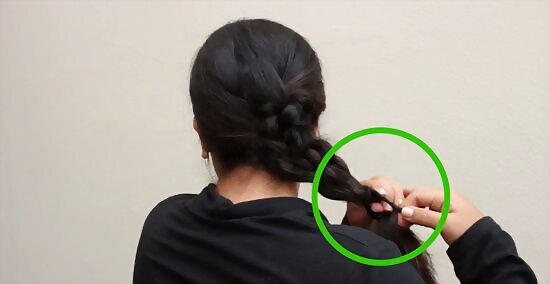
Tie off the braid. Use a ribbon or non-rubber hair elastic to secure the end of the braid. Take care not to tangle your hair as you tie it off, and choose an elastic that is wrapped in fabric.
Other Braid Styles
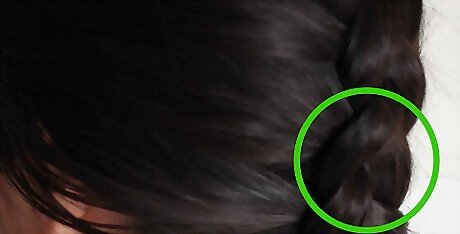
Learn how to do a Dutch braid. This is the reverse of a French braid, where instead of braiding the left and right strands over the center strand, you braid them under the middle section. Instead of the braid sitting under your hair (as with a French braid), it sits on top of your head. This look is also called an "outside braid," and it pops a little more than a traditional French braid.
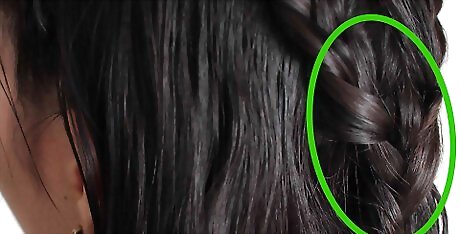
Try a waterfall braid. This beautiful style is created by letting strands of hair hang loose from a French braid, similar to the look of a waterfall. When you feel comfortable with your skills in French braiding, go a step further and try a waterfall braid.
Use your French braid skills to make a braided headband. This is a small, thin braid that goes from ear to ear across your forehead, like a headband. It uses the process of French or Dutch braiding to turn your bangs into a statement piece.
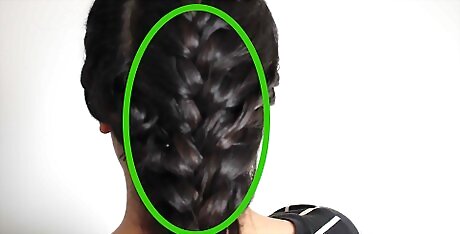
Take your 3-strand braid up a level by braiding each strand. This creates a very intricate, large braid. This style is great with a bohemian headband or pin, or to give the impression of a lot of work when you didn't do much at all!
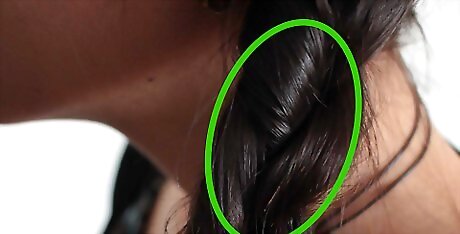
Style a rope braid for a unique look. This is a pretty braid that looks like a spiraling rope strand and is done by separating your hair into two sections and twisting them tightly before crisscrossing them over one another. It’s great for leaving down or twirling up into a bun.










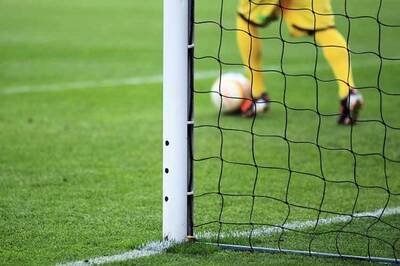
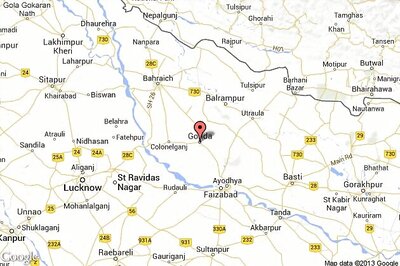





Comments
0 comment